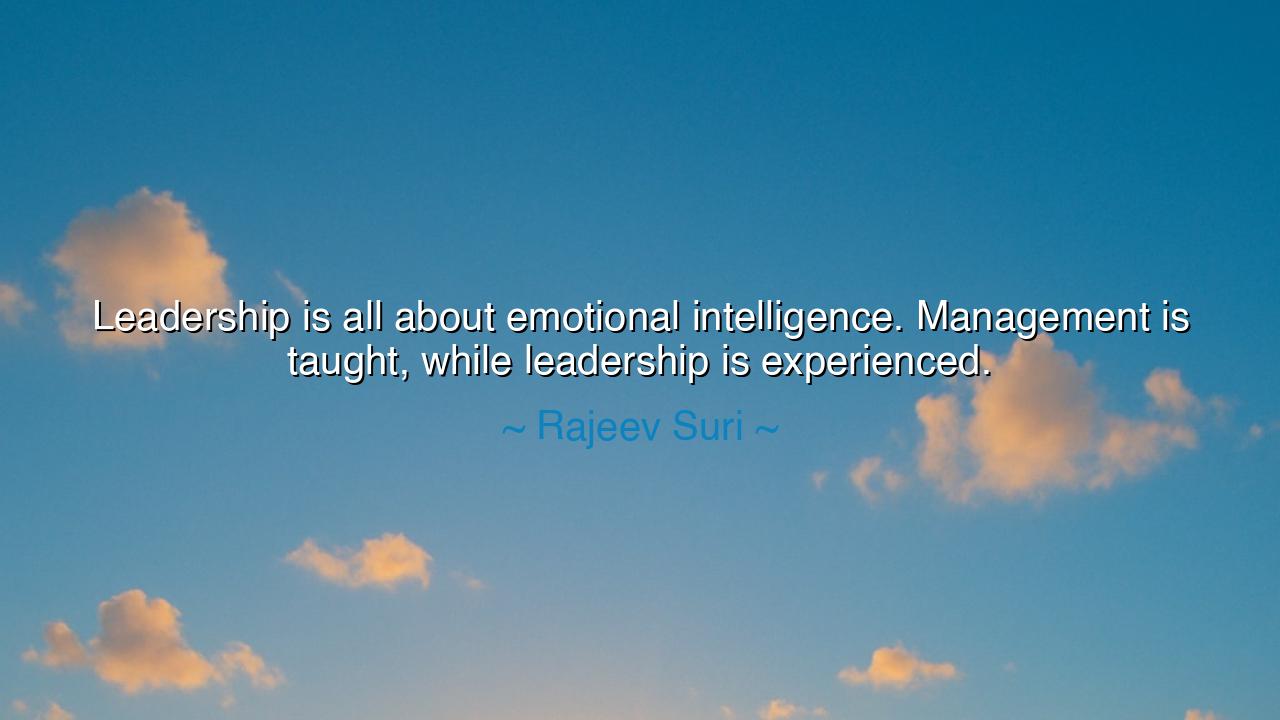
Leadership is all about emotional intelligence. Management is
Leadership is all about emotional intelligence. Management is taught, while leadership is experienced.






The visionary leader Rajeev Suri, known for guiding great enterprises through times of transformation, once spoke with rare clarity about the heart of true leadership: “Leadership is all about emotional intelligence. Management is taught, while leadership is experienced.” In these words, he divides two powers that many confuse — management and leadership — and shows us that though both are vital, only one reaches into the soul. Management is of the mind; it governs structure, process, and precision. But leadership, Suri reminds us, is of the heart — it stirs emotion, ignites faith, and binds people to purpose. It cannot be memorized from books or mastered in lectures; it must be lived, felt, and earned through experience.
When Suri speaks of emotional intelligence, he calls upon one of the oldest truths in human history: that those who rule wisely do not merely command — they understand. Emotional intelligence is not softness; it is the strength to perceive the hidden pulse of those around you. It is the ability to sense fear without judgment, to see potential where others see weakness, to lift hearts as well as numbers. A leader with emotional intelligence knows that every decision echoes through human lives, and thus weighs each choice with empathy as well as logic. It is this sacred union of mind and emotion that transforms mere authority into influence, and mere management into inspiration.
To say that management is taught is to recognize the value of knowledge and discipline. Management belongs to the realm of structure: it teaches how to build systems, measure success, and optimize performance. These are necessary arts — the bones of civilization. But Suri’s wisdom goes deeper: he tells us that leadership is experienced, for it cannot be reduced to formulas or rules. One may learn how to manage people, but to lead them requires walking beside them through both triumph and trial. A manager counts what is; a leader calls forth what could be. The first deals in instruction; the second deals in inspiration.
History is filled with examples of this eternal divide. Consider the great Abraham Lincoln, who during the fires of the American Civil War commanded not through force of title but through depth of feeling. He was not the most polished strategist, nor the most trained politician. Yet his ability to empathize — to feel the suffering of his people, to forgive his enemies, and to hold compassion even for those who betrayed him — made him a leader beyond measure. It was his emotional intelligence, his quiet understanding of the human heart, that allowed him to heal a fractured nation. He did not manage a war; he led a people through the storm toward reconciliation.
Suri’s insight also speaks to the modern age, where the world is overflowing with managers but starving for leaders. Many know how to instruct, but few know how to inspire. Many can drive performance, but few can cultivate loyalty. True leadership is not measured by quarterly results or reports, but by the growth of the human spirit within those who follow. The leader’s task is not merely to achieve, but to awaken — to help others see themselves not as they are, but as they could be. Emotional intelligence is the sacred art that makes this awakening possible, for it builds trust, fosters belonging, and transforms work into purpose.
Yet emotional intelligence cannot be copied or taught in isolation. It is forged in the fires of experience — through failure, through listening, through the humility to learn from one’s own mistakes. A leader becomes wise not by commanding, but by understanding. Every hardship, every misunderstanding, every challenge is a teacher that chisels away arrogance and awakens compassion. The one who leads with emotional intelligence is not untouched by struggle — they are deepened by it. They have walked through pain and turned it into empathy; they have faced defeat and turned it into wisdom. That is why Suri says leadership must be experienced — because the soul must be tested before it can guide others.
So let this be the lesson for those who would lead: cultivate the mind, but master the heart. Learn the sciences of management, but live the art of leadership. Read deeply, but listen more deeply still — to the unspoken fears of your people, to the needs that statistics cannot measure, to the spirit that lies behind every task. When you make a decision, ask not only, “Is it efficient?” but also, “Is it human?” For leadership is not about controlling the world — it is about uplifting it.
And thus, as Rajeev Suri teaches, the truest leaders are not remembered for the systems they built, but for the hearts they touched and the courage they inspired. The leader with emotional intelligence stands not above their people, but among them — steady as a mountain, compassionate as the rain. To lead in this way is not to seek power, but to give it; not to command obedience, but to awaken greatness. For management governs what already exists, but leadership creates what has never been — and it does so not through force of intellect, but through the boundless wisdom of the heart.






AAdministratorAdministrator
Welcome, honored guests. Please leave a comment, we will respond soon